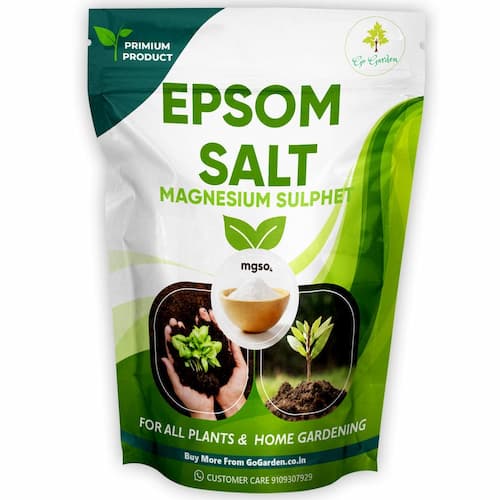
Many people know the medicinal benefits. It is quite useful in the home garden, too. This naturally occurring chemical was first found in wells in Epsom, England in the early 1800s. Many gardeners use Epsom salt organic fertilizer.
Gardeners use Epsom Salt as a natural plant supplement. Interestingly, researchers are not completely sold on its benefits. Yet, home gardeners who use it, swear by its benefits. What makes Epsom Salt so good for your plants? It’s the Magnesium and Sulfur content.
Epsom salt is helpful in all soils. But, it is more effective in acidic soil.
Did you Know? Like other salts, it can melt ice. But, it is slower and costlier than other salts.
Magnesium and Sulfur are two key elements in Epsom Salt, that help your plants. These minerals play an important role in your plant’s health and growth. Epsom salt is highly soluble, making it easy to be absorbed by plant roots and leaves.
Magnesium is sometimes absent or scarce in garden soil. It is very important for seed germination and the production of chlorophyll. Magnesium helps to strengthen cell walls, aiding in the formation of fruit and seeds. It also improves your plants’ ability to take up other important chemicals, like nitrogen, phosphorous, and sulfur.
Sulfur is essential to the inner working of plants.
The chemical composition is: MgSO4-7H20
It includes: Magnesium, Sulfur, Oxygen, and Hydrogen
There… aren’t you happy that you know!?
Epsom Salt is a natural deterrence for some garden pests, too.
Slugs stay away from it. Sprinkle a little in a circle around your plants. Slugs and snails will not cross it.
Voles, mice, squirrels, and rodents do not like it, and will stay away.
You can use this fertilizer on all of your plants.
Gardeners find it is most useful on Roses, Tomatoes, and Peppers.
Try a little on your indoor houseplants.
For roses, spread 4 ounces around each rose bush in the spring. Mix it into the surrounding soil. For summer applications Mix 1 Tablespoon in a gallon of water.
For Tomatoes and peppers, mix 1 Tablespoon in a gallon of water. Apply in the summer months. It will help to improve production.
Be careful with foliar feeding. Epsom Salt can scorch leaves. Avoid foliar feeding of roses.
For other plants use 1 Tablespoon in a gallon of water.
Do not apply foliar feeding on hot, sunny days.
People who like this article will also like:
©1999-2024 GardenersNet.Com, All Rights Reserved